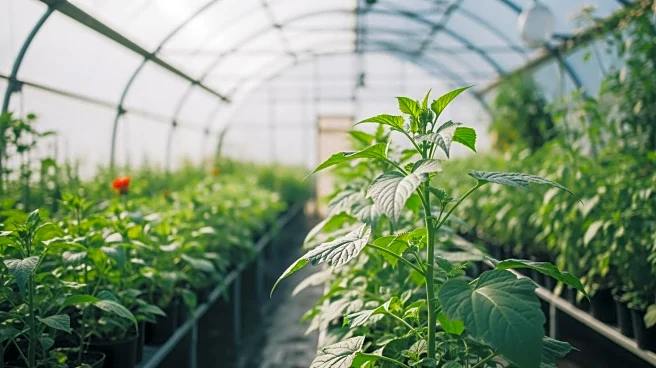What's Happening?
The United States climate-resilient agriculture market is anticipated to grow significantly, reaching $61.50 billion by 2032. This growth is driven by advancements in technologies and practices designed
to help farmers adapt to climate change impacts such as extreme weather, droughts, and soil degradation. Key developments include the introduction of drought-tolerant corn seeds in Nebraska by Corteva Agriscience, Monsanto's investment in AI-driven precision irrigation systems in California, and Bayer CropScience's climate-resilient soybean cultivars in the Midwest. These initiatives aim to enhance agricultural productivity, ensure food security, and reduce environmental risks while supporting sustainable farming practices.
Why It's Important?
The expansion of the climate-resilient agriculture market is crucial for addressing the challenges posed by climate change on food production. By adopting precision agriculture technologies, such as IoT sensors and AI-powered farm management software, farmers can optimize resource use and better adapt to climate variability. This transition is supported by strong government policies, including subsidies and funding mechanisms, which facilitate the adoption of climate-smart practices. The market's growth not only ensures food security but also promotes sustainable agricultural systems, reducing environmental impact and supporting economic stability in the agricultural sector.
What's Next?
As the market continues to grow, further investments in research and development are expected to enhance the effectiveness of climate-resilient technologies. Stakeholders, including government agencies and private companies, are likely to increase their focus on developing new crop varieties and farming techniques that can withstand climate extremes. Additionally, policy initiatives may expand to include more comprehensive support for farmers transitioning to sustainable practices, potentially leading to increased adoption rates and further market growth.
Beyond the Headlines
The shift towards climate-resilient agriculture may have broader implications for rural communities and the agricultural workforce. As technology becomes more integrated into farming practices, there may be a need for workforce retraining and education to ensure farmers can effectively utilize new tools. Moreover, the emphasis on sustainability could lead to cultural shifts in farming communities, promoting environmental stewardship and long-term resource management.











